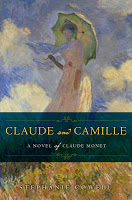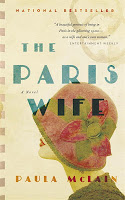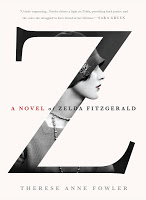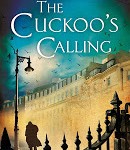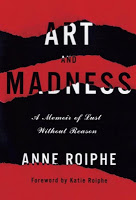 I have read of few books in the last few years about the women who have inspired artists including The Paris Wife (M) by Paula McLain, Z: a novel of Zelda Fitzgerald (M) by Therese Anne Fowler and Claude and Camille: a novel of Monet (M) by Stephanie Cowell.
I have read of few books in the last few years about the women who have inspired artists including The Paris Wife (M) by Paula McLain, Z: a novel of Zelda Fitzgerald (M) by Therese Anne Fowler and Claude and Camille: a novel of Monet (M) by Stephanie Cowell.
None of these novels suggest that the role of a muse is without hardship, and this is certainly born out by Anne Roiphe’s memoir Art and Madness: a memoir of lust without reason (M),
 Anne Roiphe may be best known as a feminist author, reviewer and essayist whose novel Up the Sandbox (M) fueled her career. Before that happened, before she discovered her own voice, she passionately desired to live her life as a muse to a great writer. Roiphe grew up on privileged Park Avenue but elected to turn her back on this life by reading publications like The Daily Worker and adopting the beliefs of writers, artists and intellectuals. It was New York in the 1950s and 1960s and she rubbed shoulders with authors like George Plimpton, Terry Southern and William Styron. She believed that alcohol fueled the writer’s creativity and gave herself to them selflessly regardless of the cost.
Anne Roiphe may be best known as a feminist author, reviewer and essayist whose novel Up the Sandbox (M) fueled her career. Before that happened, before she discovered her own voice, she passionately desired to live her life as a muse to a great writer. Roiphe grew up on privileged Park Avenue but elected to turn her back on this life by reading publications like The Daily Worker and adopting the beliefs of writers, artists and intellectuals. It was New York in the 1950s and 1960s and she rubbed shoulders with authors like George Plimpton, Terry Southern and William Styron. She believed that alcohol fueled the writer’s creativity and gave herself to them selflessly regardless of the cost.
Her first husband, a playwright, married her because he felt that marriage was meaningless, so why not marry? He took the money for their honeymoon and deserted her and spent it on alcohol and prostitutes. Her husband, who appeared to suffer from a neurological disorder, took her money and treated her with cruel indifference. She did get something out of these relationships. She was given entrance to the artistic and intellectual world she so craved that allowed her to feel as if she were Hadley Hemingway losing her husband’s manuscript on a train or as if she were Zelda Fitzgerald dancing her way to immortality. Rather than the madness the title implies, Roiphe seemed as if she were besotted by this world and it took concern for her young daughter to keep her grounded and to help her eventually hear her own voice.
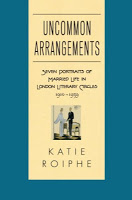 Anne Roiphe’s daughter Katie Roiphe wrote, not only a book that I enjoyed very much Uncommon Arrangements: seven portraits of married life in London literary circles, 1910-1939, (M) but also this one that looks very interesting – In Praise of Messy Lives: essays. (M)
Anne Roiphe’s daughter Katie Roiphe wrote, not only a book that I enjoyed very much Uncommon Arrangements: seven portraits of married life in London literary circles, 1910-1939, (M) but also this one that looks very interesting – In Praise of Messy Lives: essays. (M)
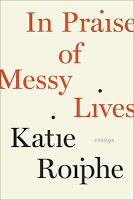 “Katie Roiphe’s writing—whether in the form of personal essays, literary criticism, or cultural reporting—is bracing, wickedly entertaining, and deeply engaged with our mores and manners. In these pages, she turns her exacting gaze on the surprisingly narrow-minded conventions governing the way we live now. Is there a preoccupation with “healthiness” above all else? If so, does it lead insidiously to judging anyone who tries to live differently? Examining such subjects as the current fascination with Mad Men, the oppressiveness of Facebook (“the novel we are all writing”), and the quiet malice our society displays toward single mothers, Roiphe makes her case throughout these electric pages. She profiles a New York prep school grad turned dominatrix; isolates the exact, endlessly repeated ingredients of a magazine “celebrity profile”; and draws unexpected, timeless lessons from news-cycle hits such as Arnold Schwarzenegger’s “love child” revelations. On ample display in this book are Roiphe’s insightful, occasionally obsessive takes on an array of literary figures, including Jane Austen, John Updike, Susan Sontag, Joan Didion, and Margaret Wise Brown.” publisher
“Katie Roiphe’s writing—whether in the form of personal essays, literary criticism, or cultural reporting—is bracing, wickedly entertaining, and deeply engaged with our mores and manners. In these pages, she turns her exacting gaze on the surprisingly narrow-minded conventions governing the way we live now. Is there a preoccupation with “healthiness” above all else? If so, does it lead insidiously to judging anyone who tries to live differently? Examining such subjects as the current fascination with Mad Men, the oppressiveness of Facebook (“the novel we are all writing”), and the quiet malice our society displays toward single mothers, Roiphe makes her case throughout these electric pages. She profiles a New York prep school grad turned dominatrix; isolates the exact, endlessly repeated ingredients of a magazine “celebrity profile”; and draws unexpected, timeless lessons from news-cycle hits such as Arnold Schwarzenegger’s “love child” revelations. On ample display in this book are Roiphe’s insightful, occasionally obsessive takes on an array of literary figures, including Jane Austen, John Updike, Susan Sontag, Joan Didion, and Margaret Wise Brown.” publisher

